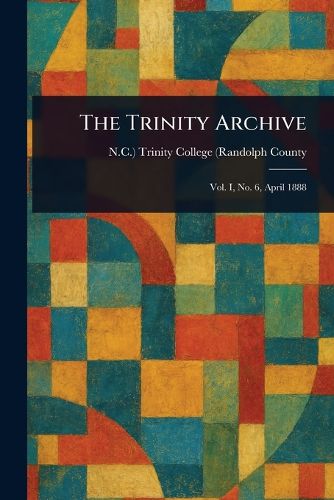Readings Newsletter
Become a Readings Member to make your shopping experience even easier.
Sign in or sign up for free!
You’re not far away from qualifying for FREE standard shipping within Australia
You’ve qualified for FREE standard shipping within Australia
The cart is loading…






This title is printed to order. This book may have been self-published. If so, we cannot guarantee the quality of the content. In the main most books will have gone through the editing process however some may not. We therefore suggest that you be aware of this before ordering this book. If in doubt check either the author or publisher’s details as we are unable to accept any returns unless they are faulty. Please contact us if you have any questions.
Step back in time with "The Trinity Archive, Vol. 1, No. 6, April 1888," a fascinating snapshot of student life at Trinity College in North Carolina. This meticulously reproduced edition offers a glimpse into the world of late 19th-century college students through their own words.
Published by the students themselves, this periodical provides a unique perspective on the issues, opinions, and culture that shaped their daily experiences. Explore articles and insights reflecting the era's social and intellectual landscape.
A valuable resource for those interested in the history of higher education, student journalism, and North Carolina's past, "The Trinity Archive" preserves a significant voice from a bygone era. Discover the authentic voice of a generation as they navigated their college years within the walls of Trinity College. This volume offers enduring insight into the concerns and aspirations of young minds on the cusp of a rapidly changing world.
This work has been selected by scholars as being culturally important, and is part of the knowledge base of civilization as we know it.
This work is in the public domain in the United States of America, and possibly other nations. Within the United States, you may freely copy and distribute this work, as no entity (individual or corporate) has a copyright on the body of the work.
Scholars believe, and we concur, that this work is important enough to be preserved, reproduced, and made generally available to the public. We appreciate your support of the preservation process, and thank you for being an important part of keeping this knowledge alive and relevant.
$9.00 standard shipping within Australia
FREE standard shipping within Australia for orders over $100.00
Express & International shipping calculated at checkout
Stock availability can be subject to change without notice. We recommend calling the shop or contacting our online team to check availability of low stock items. Please see our Shopping Online page for more details.
This title is printed to order. This book may have been self-published. If so, we cannot guarantee the quality of the content. In the main most books will have gone through the editing process however some may not. We therefore suggest that you be aware of this before ordering this book. If in doubt check either the author or publisher’s details as we are unable to accept any returns unless they are faulty. Please contact us if you have any questions.
Step back in time with "The Trinity Archive, Vol. 1, No. 6, April 1888," a fascinating snapshot of student life at Trinity College in North Carolina. This meticulously reproduced edition offers a glimpse into the world of late 19th-century college students through their own words.
Published by the students themselves, this periodical provides a unique perspective on the issues, opinions, and culture that shaped their daily experiences. Explore articles and insights reflecting the era's social and intellectual landscape.
A valuable resource for those interested in the history of higher education, student journalism, and North Carolina's past, "The Trinity Archive" preserves a significant voice from a bygone era. Discover the authentic voice of a generation as they navigated their college years within the walls of Trinity College. This volume offers enduring insight into the concerns and aspirations of young minds on the cusp of a rapidly changing world.
This work has been selected by scholars as being culturally important, and is part of the knowledge base of civilization as we know it.
This work is in the public domain in the United States of America, and possibly other nations. Within the United States, you may freely copy and distribute this work, as no entity (individual or corporate) has a copyright on the body of the work.
Scholars believe, and we concur, that this work is important enough to be preserved, reproduced, and made generally available to the public. We appreciate your support of the preservation process, and thank you for being an important part of keeping this knowledge alive and relevant.